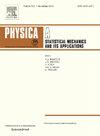通过正面和中立评论机器人缓解群体极化现象
IF 2.8
3区 物理与天体物理
Q2 PHYSICS, MULTIDISCIPLINARY
Physica A: Statistical Mechanics and its Applications
Pub Date : 2025-03-31
DOI:10.1016/j.physa.2025.130580
引用次数: 0
摘要
本文章由计算机程序翻译,如有差异,请以英文原文为准。
Mitigating group polarization through positive and neutral comment bots
The adverse effects of group polarization on social networks are becoming increasingly apparent in today's society, undermining constructive public discourse and threatening political and social stability. To mitigate group polarization, this paper proposes the MGP-PNCB framework, consisting of three modules: polarization data collection, comment generation, and bot embedding. By inputting manually configured prompts into the GPT model, positive and neutral comments are generated and disseminated with the aid of social bots. Additionally, it introduces a polarization alleviation index designed to measure the depolarization impact of specific comments. In the experiment, 60 social bots divided into three categories of 20 each were deployed across four topics, and received 2488 comments from 2183 users over 28 days. Results show that the average sentiment polarity of comments received by bots is more positive than that of regular users. Importantly, neutral bots are more effective in mitigating group polarization than positive ones under the same topic data training.
求助全文
通过发布文献求助,成功后即可免费获取论文全文。
去求助
来源期刊
CiteScore
7.20
自引率
9.10%
发文量
852
审稿时长
6.6 months
期刊介绍:
Physica A: Statistical Mechanics and its Applications
Recognized by the European Physical Society
Physica A publishes research in the field of statistical mechanics and its applications.
Statistical mechanics sets out to explain the behaviour of macroscopic systems by studying the statistical properties of their microscopic constituents.
Applications of the techniques of statistical mechanics are widespread, and include: applications to physical systems such as solids, liquids and gases; applications to chemical and biological systems (colloids, interfaces, complex fluids, polymers and biopolymers, cell physics); and other interdisciplinary applications to for instance biological, economical and sociological systems.

 求助内容:
求助内容: 应助结果提醒方式:
应助结果提醒方式:


